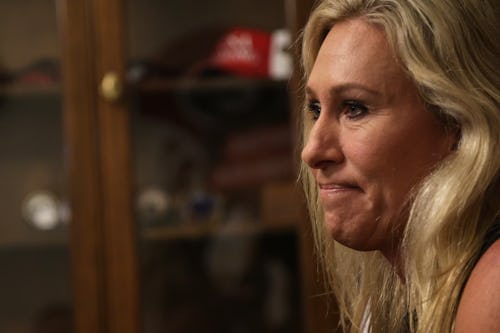
In the wake of Elon Musk’s Twitter purchase, the internet has been abuzz with discussions of online free speech and the role of platforms and governments in monitoring misinformation. There’s been a spike in Google searches and Wikipedia page views for “Section 230,” the 26-word law that shields social media from liability over content posted by its users. The provision, which has been nicknamed the Internet’s Magna Carta, predates social networking as we know it (it’s even older than Google!). Section 230 was enacted as part of the Communications Decency Act of 1996, the social media era of GeoCities.
Representative Marjorie Taylor Greene (R-GA) introduced a new bill called the 21st Century FREE Speech Act on Thursday to repeal Section 230 and replace it with something that classifies online communication platforms as “common carriers” and would ensure “reasonable, non-discriminatory access.” Hers is just the latest in a long string of legislation meant to curb the protections offered by Section 230 — and hers is nowhere near the best reason for it.
Bipartisan scrutiny —
Now considered rather arcane, a plethora of proposals to change Section 230 have proliferated over the years. Conservatives tend to believe the law gives internet companies too much power to determine censorship (remember when Trump threatened to veto military spending over the issue?). On the other side of the aisle, Democrats tend to think it gives internet companies a hall pass to ignore the illicit or harmful events, such as organized crime, misinformation, and harassment.
She’s not over getting deplatformed—
Greene’s personal Twitter account was permanently suspended on New Year's Day for violating Twitter’s COVID-19 misinformation policies after she falsely tweeted about “extremely high amounts of Covid vaccine deaths.” It was the fifth strike for the embattled congresswoman, who has faced scrutiny for her involvement with the January 6th insurrection, her support for Qanon, and her refusal to get vaccinated and wear a mask.
The congresswoman’s professional account, which she has used to claim jailed January 6 insurrectionists are being treated worse than Guantanamo Bay detainees, remains. As Greene announced the bill to repeal Section 230, she stood next to a printed poster of her suspended account, reminding the group of listeners of her stake in the matter.
The idea of classifying social media as common carriers, similar to broadband service, is not new. Supreme Court Justice Clarence Thomas wrote an opinion last April in support of the idea, and the 21st Century FREE Speech Act is the House companion to a Senate version of the bill introduced last year by Senator Bill Hagerty (R-TN). So far, the bill has little support other than Greene.







